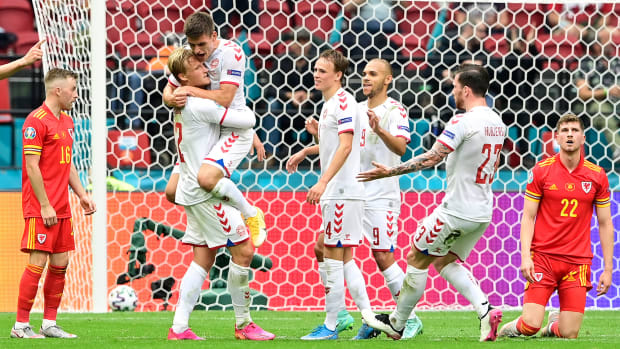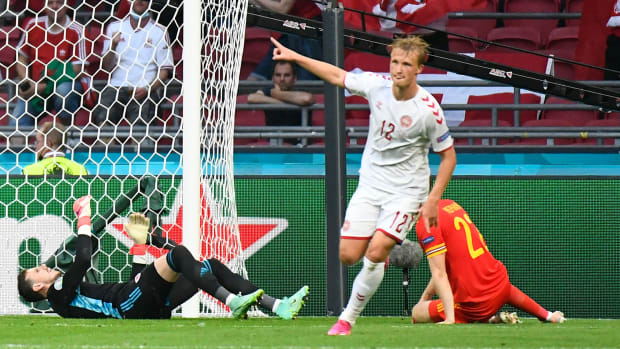Denmark's Euros began under harrowing circumstances, but with Christian Eriksen on the mend and the Danes onto the quarterfinals, there are many reasons for optimism.
How far can Denmark go? An emphatic, 4–0 victory over Wales on Saturday means it has reached the quarterfinals of Euro 2020, where it will play either the Netherlands or Czech Republic in Baku, Azerbaijan. Perhaps that is no more than was anticipated after the way the knockout bracket unfolded, but what was not expected was the sense of momentum behind Kasper Hjulmand’s side—which is all the more extraordinary given it was just two weeks ago that its players stood around their teammate, Christian Eriksen, after he had suffered a cardiac arrest on the pitch.
This wasn’t Copenhagen and the atmosphere wasn’t quite so passionate as that which has been generated there over the past two games, but a change to COVID-19 restrictions by Dutch authorities on Friday meant thousands of Danish fans were able to make their way to Amsterdam and, somehow, secure tickets. They outnumbered Welsh fans—the only ones permitted were those who live in the Netherlands—by a factor of 50 to one or more. But then Wales was heavily outnumbered by Turkish fans in Baku, and it made little difference. This really wasn’t about the atmosphere.
Denmark is a much better side than Turkey, and it continues to ride a tide of emotion after the Eriksen incident. The Inter Milan player, now happily recuperating in Copenhagen, permeates everything in this Danish campaign. As the captains bumped fists and exchanged gifts before kickoff, Gareth Bale responded to the pennant handed to him by Kasper Schmeichel with a Wales No. 10 shirt bearing the message “Get well, Christian” in Welsh. It was a similar gesture to what Belgium did in their group meeting, in which the match was stopped for a minute's applause while Eriksen recovered in a hospital down the road.

And the influence of Eriksen is there, too, in the way Denmark is approaching games. A team that can often seem a little cautious, prioritizing solidity over style and that was thought to be reliant on Eriksen for creativity, has found a new way to play. The normal protocols no longer apply; this is a unique period in the country’s football. There is a strange sense in which this is a little like 1992, when Denmark replaced Yugoslavia in the European Championship at the final moment and went on to win the tournament. There is no pressure, in that nobody expects anything, and yet there is also a sense of purpose within the camp and goodwill from without.
Wales, with its attractive football and spirited fans, has become, over recent years, used to carrying the favor of neutrals, but here that very clearly belonged to the other team. This was all about Denmark, and suddenly it feels as if everything is going its way. Yussuf Poulsen, having scored three goals in his last five games, was ruled out with a hamstring injury and replaced by former Ajax forward Kasper Dolberg. No problem: he promptly scored twice. (Oddly, he tends to score in pairs, at least for his national side. His nine international goals include braces against Georgia, Luxembourg, Moldova and now Wales.)
On what used to be his home ground, Dolberg put Denmark ahead after 27 minutes, seizing on fine approach work from Joakim Maehle and the scurrying Mikkel Damsgaard, who only came into the side after the change of shape, and clipping a firm shot just inside the post from 25 yards.

It was the least Denmark deserved. Wales had a little flurry in the opening 10 minutes, as Bale kept finding space, but Denmark reacted quickly, pushing Andreas Christensen into a deep-lying midfield role to close down Aaron Ramsey, and so stifled the Welsh threat at the source. For the final half hour of the first half, Denmark dominated. The only doubt was whether it would regret not having made more of its chances.
But just three minutes into the second half, Dolberg got a second. Wales complained that Simon Kjaer had fouled Kieffer Moore in the build-up, but the defending after that was dreadful, as Martin Braithwaite was allowed to run unchecked into the box, and Neco Williams than hacked a panicky clearance straight at Dolberg, who smashed it low past Danny Ward.
And that was that. Wales, having played so well against Turkey to get through the group, was never able to find any rhythm after that first 10 minutes, its misery completed by a late red card for Harry Wilson for a frustrated hack at Maehle.
Twice, Denmark hit the post, but it didn’t matter. A third arrived from the Maehle with three minutes remaining and a fourth from Braithwaite in injury time. This was a thoroughly convincing victory, and it held out the promise of far more. Denmark is not just a team playing with the spirit provoked by that awful moment of two weeks ago, and it's not just a team fortunate enough to be on the more favorable side of the bracket. It has a new sense of confidence and togetherness and has found an extremely effective way of playing.
More Euro 2020 Coverage:
No comments:
Post a Comment